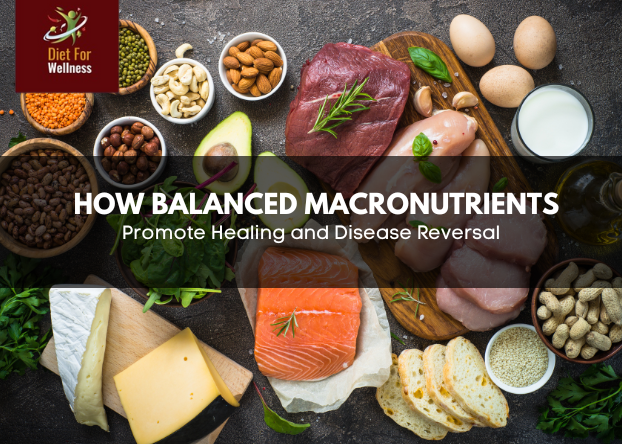How Balanced Macronutrients Promote Healing and Disease Reversal

The journey to healing and disease reversal is not only about medical interventions or lifestyle changes but also about nourishing our bodies with the right nutrients. One important factor in this process is understanding and balancing macronutrients—proteins, carbohydrates, and fats—which play a significant role in restoring health, improving body function, and helping in the reversal of certain diseases.
What Are Macronutrients?
The nutrients required by our bodies require in large amounts to function properly.
They are essential for providing energy and supporting numerous bodily functions, including cell growth, immune response, and muscle repair.
There are three primary macronutrients
- Proteins– Made up of amino acids, proteins are the building blocks for muscles, enzymes, and immune cells. They are vital for tissue repair, especially during the healing process.
- Carbohydrates– These are the body’s primary energy source, providing fuel for brain function, physical activity, and various metabolic processes. Complex carbs, such as whole grains, vegetables, and fruits, are rich in fiber, which is beneficial for gut health and overall digestion.
- Fats– Fats are a concentrated energy source and are vital for the absorption of fat-soluble vitamins (A, D, E, K). Healthy fats, such as omega-3 fatty acids found in fish and flaxseeds, help reduce inflammation and support heart and brain health.
How Balanced Macronutrients Support Healing
A proper balance of macronutrients can significantly impact the body’s ability to heal and recover from illness or injury. Listed below are the ways in which each macronutrient supports the healing process.
- Protein- Essential for Tissue Repair and Immune Function
Protein is particularly important for tissue repair and immune function. When the body is healing from an injury, surgery, or fighting an infection, it needs extra protein to build and repair damaged tissues. Proteins also help produce enzymes and antibodies that fight off infections, making them indispensable in the recovery process.
Protein helps with muscle preservation and prevents muscle wasting, a common issue for individuals with chronic diseases like diabetes, kidney disease, or cancer. A protein-rich diet can support weight management by maintaining lean muscle mass while helping to reverse insulin resistance.
- Carbohydrates- Providing Energy for Recovery
Carbohydrates are the body’s primary source of fuel. While simple sugars can cause blood sugar spikes and contribute to inflammation, complex carbohydrates (like whole grains, legumes, and vegetables) release energy slowly and steadily, preventing energy crashes and promoting sustained healing.
Balanced carb intake helps regulate blood sugar levels, which is particularly important for those managing diabetes. When you replace refined carbs with whole, fiber-rich foods, you will be able to stabilize blood sugar, enhance digestion, and improve gut health—key factors in reversing diseases like Type 2 diabetes and metabolic syndrome.
- Fats- Reducing Inflammation and Supporting Healing
Healthy fats, especially omega-3 fatty acids, are important for reducing inflammation in the body. Chronic inflammation is a hallmark of many diseases, including cardiovascular disease, autoimmune conditions, and diabetes. Incorporate anti-inflammatory fats such as those found in avocados, nuts, seeds, and fatty fish, to support your healing process and reduce the symptoms of inflammatory conditions.
Omega-3 fats have been shown to reduce the risk of heart disease, decrease cholesterol levels, and support brain health. In conditions like rheumatoid arthritis and psoriasis, omega-3-rich diets can reduce inflammation and promote joint healing, contributing to the reversal of chronic conditions.
The Importance of a Balanced Approach
While each macronutrient plays a distinct role in the healing process, it’s the balance between them that creates an optimal environment for disease reversal. For example, consuming a high-protein diet without sufficient healthy fats or carbohydrates could put unnecessary stress on the kidneys or lead to nutrient imbalances. Conversely, too many carbohydrates without adequate protein or fats could lead to weight gain and insulin resistance.
An ideal approach includes
- Moderate Protein Intake– Ensures muscle repair and immune function without burdening the kidneys or digestive system.
- Healthy Fats– Focus on omega-3s, monounsaturated fats, and moderate amounts of omega-6s to combat inflammation and support hormone balance.
- Complex Carbohydrates– Emphasize fiber-rich vegetables, fruits, and whole grains to provide steady energy, promote gut health, and regulate blood sugar.
Tips for Balancing Macronutrients
- Eat a Variety of Whole Foods– Include a wide range of plant-based foods (fruits, vegetables, legumes, and whole grains) along with lean proteins (chicken, fish, beans) and healthy fats (olive oil, nuts, seeds).
- Avoid Processed Food- Limit intake of refined carbs, processed sugars, and unhealthy fats, which can contribute to inflammation, weight gain, and disease progression.
- Focus on Meal Timing– Instead of large, irregular meals, try eating smaller, balanced meals throughout the day. This helps with digestion, stable blood sugar, and sustained energy.
- Stay Hydrated– Adequate water intake is essential for nutrient transport and overall health. Pair your balanced meals with plenty of water to ensure proper nutrient absorption and support the healing process.
A diet rich in balanced macronutrients is ideal for healing and empowering the body to reverse certain health conditions. Focus on protein for tissue repair, complex carbohydrates for energy, and healthy fats to combat inflammation, and optimize your health and support your body’s natural healing processes.
This approach can provide significant benefits for those looking to reverse diseases like diabetes, cardiovascular conditions, and autoimmune disorders, offering hope through nutrition as an essential part of the recovery journey.
